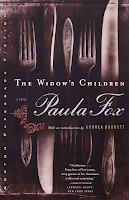That girl! That girl with her open mouth, her idiot fearfulness--and Peter Rice, an insect husk, the goddamned vampire sucking her life away, that bloodless Christian sewing machine with his intolerable daintiness--what had she to do with such creatures, what did she have to do with thick-witted, thick-ankled old Desmond and his infant thieving of liquor, or with debauched Carlos--but at the thought of Carlos, Laura began to cry. She didn't understand anything! The unyielding mystery of her impulses was punishment enough for whatever she had done--she thought she had put them to sleep so long ago, that they had withered away just as she was withering away, but they were awake, the old beasts of her life, so merciless, so cruel.
A group of people gather in a hotel room, then a restaurant: Laura, an outspoken Spanish emigrant, her alcoholic husband Desmond, her daughter from a prior marriage, Clara, her gay brother Carlos, and an old friend, an unassuming publisher named Peter Rice. It is the night before Laura and Desmond are supposed to leave for a long voyage to Africa, and they are saying goodbye. But that afternoon, Laura has received a phone call: her mother, Alma, has died. Though she shares the news with no one, the death brings out in her intense feelings about the difficult and complicated childhood she endured with Carlos and a third, absent sibling, Eugenio, as well as the failure of her previous marriage. Laura is wry and sardonic; she tends to say whatever is on her mind, which is often outrageous and cruel, but the death of her mother she keeps jealously to herself. The night becomes for everyone--for reasons not clear to them--a rehashing of all their old difficulties, the crucible of human life that has formed them and gotten them here.
I had high hopes for The Widow's Children; I love love loved Paula Fox's book Desperate Characters, which shares with this one a kind of contracted scope and focus. And I walked away once again in awe of Fox's writing, which brims with hot surprises in every sentence: calling Peter Rice a "bloodless Christian sewing machine," Desmond's alcohol-filching "infant," the "old beasts of her life"--all so wonderful. The book as a whole suffers from being overstuffed, though, even though it tries to capture the singular moment. I had trouble keeping all the histories straight. Some people who do not appear and are only mentioned, like Laura's ex and Clara's husband, Ed, and the supercilious Cuban lady who looked after Alma and her family after they immigrated from Spain, seemed too distant to bring so much to bear on the narrative. The attempt to gather all the conflicts of a family life into a single point, I thought, was probably always doomed to be not quite successful.
I thought much better of The Widow's Children in the second half, when Laura escapes from the restaurant, before reappearing at Peter Rice's to beg him to go to her siblings and do what she cannot: tell them of her mother's death. (It answers, among other things, the question of why this extraneous character seems to be here at all.) She jealously demands, for reasons that weren't quite clear to me, that Peter not tell her daughter. The scenes of Peter visiting first Eugenio, then Carlos, then Clara, against Laura's wishes, were the strongest of the book, and they turned a novel that seemed quite scattered and unfocused into one with a real sense of thrust and purpose. It's no Desperate Characters--maybe that novel was, as they say, lightning in a bottle--but the second half of the book certainly brings these desperate characters into reality./


No comments:
Post a Comment